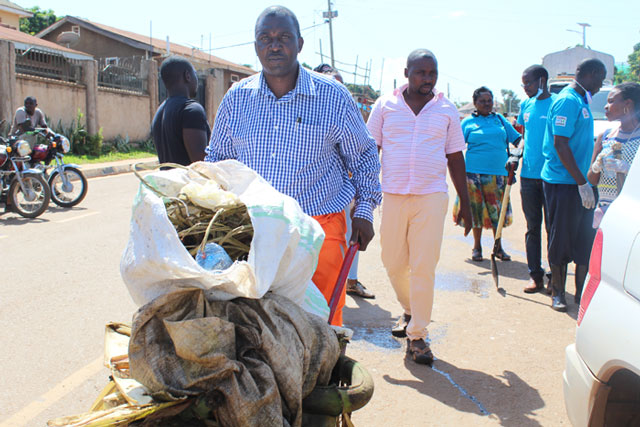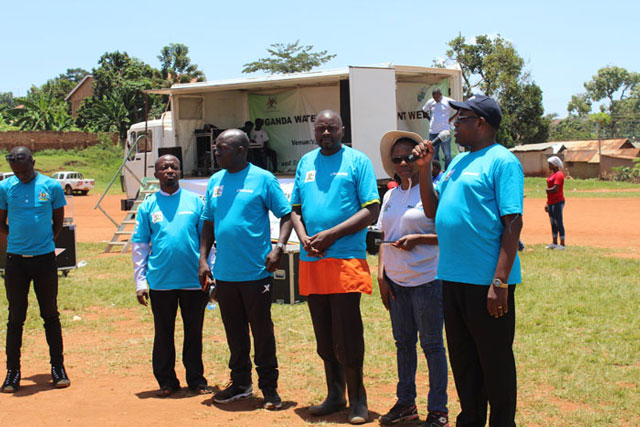
Entebbe, Uganda | THE INDEPENDENT | President Yoweri Museveni is today expected to officially commission the Uganda Water and Environment Week (UWEWK) organized by the Ministry of Water and Environment.
The second edition of the Uganda Water and Environment Week (UWEWK ) has started, with the theme: Water and Environment a strategic driver in attainment of Sustainable Development Goals (SDGs) 2030.
The goal of UWEWK 2019 to improve understanding of the centrality of water and environment resources in attainment of SDGs by 2030.
Starting on Monday 18th March, the event is expected to attract nearly 1000 participants, representing a wide range of water and environment stakeholders, including policy makers, technical specialists, academicians, public and private sector institutions, Civil Society Organizations (CSOs), Non-Governmental Organizations (NGOs) and other members of the public.
A wide range of activities have been planned for the week including high level panel discussions, keynote addresses, paper presentations, side events, practical training, exhibitions, excursions and community activities.
The panel discussions will comprise a mix of prominent leaders and personalities including: Right Hon Rebecca Kadaga, Speaker of the Parliament of Uganda; Ow’ekitibwa Charles Peter Mayiga, Kattikiro of Buganda Kingdom; Bishop George Bagamuhunda of Kigezi Diocese and Mr Patrick Bitature Chairman, Private Sector Foundation among others.
Reflecting on the exponential growth of the event only in its second year, Dr Callist Tindimugaya, Commissioner, Water Resources Planning and Regulation attributed all the success to the unrelenting support of partners.
“Last year we had 350 participants, but this year we are expecting about 1000 participants. This shows that Ugandans have already picked interest in the event. For the first time we have sponsors reaching out and asking if they can join us but last year we were the ones looking for them,” Tindimugaya said.
He said the organizing committee had held preparatory meeting since October 2018 and had attracted over 35 partners. He also said that the organizing committee had received over 140 abstracts from interested participants, and these had all contributed to the rich content to be delivered during the 2019UWEWK. “We listened to a wide range of stakeholders who exchanged views and ideas on how to develop the event. We listened to researchers, academics, government partners, CSOs.”
Addressing the media during the pre-launch events of the week on Saturday at Kiwafu, Entebbe Kitooro, Tindimugaya told the residents that they need to maintain surface and ground resources, if Uganda is to attain SDGs 6.

He assured the community that the government, through National Water and Sewerage Corporation (NWSC), is trying hard to bring affordable safe water closer to the people and revealed that plans are under way to increase the number of public stand pipes at different locations in the community.
The Mayor of Entebbe De Paul Kayanja, called for the protection of water resources. “The first thing we need to do is protect the wetlands and swamps and plant more trees. We need to mitigate the dumping of plastic waste especially the plastic bottles and polythene bags commonly known as kavera which is affecting our environment,” Kayanja said.
Kayanja told them to separate bio-degradable garbage from non-degradable garbage like plastics, and broken glasses. Bio-degradable garbage can be used for manure. He said that there is an ongoing campaign in Entebbe in which all residents are urged required to have a bathroom, toilets and dish stands.
He decried the practice of selling water at exorbitant prices yet the sellers get the water cheaply from NWSC. “Most residents in Entebbe have piped water but those who do not have purchase a jerry can at sh500 from water stands,” he said.
The Country Director Water Uganda, Jane Sembuche Mselle, hailed community involvement in the UWEWK activities and said that was crucial to the attainment of SDG targets. “11 years from now we shall have a proper environment if the communities especially the young children and other stakeholder get involved,” she said.
Jessy Birungi a Kitoro resident, said that the lake should be protected and people who wash cars, bath in the lake should be stopped. “Our municipality needs to come up with a bye law on this. The law on plastic bags commonly known as kavera should also be implemented,” Birungi urged.
Sebwana Charles Kisiriza Chief Busiro county, Buganda Kingdom started this campaign known as Bulungi Bwansi in order to protect our environment, all we need to do as communities is to avoid constructing in the wetlands.
The head teacher Kiwafu Primary School, Samuel Kizikiiza, this is a god campaign, and it is a move in the right dirction since they have involved school children. They will grow up knowing that they should protect the environment.
Eron Vello Bubye Mutuba Etaano, Busiro Sub county, this is a good move especially for us in Buganda Kingdom, we are moving at the same pace with government, we need more sensitization on protecting the environment.
2018 UWEWK
During the 2018 UWEWK, the Ministry of Water and Environment launched the Water Resources Institute (WRI), which has since conducted over 18 training sessions, benefitting over 700 people and covering a wide range of topics on water and environment – like sector financing, water source protection, ground water development, borehole drilling, water in emergency situations, IWRM, climate change.
The main beneficiaries of the training have so far been private sector actors, MWE staff in decentralised structures, NGOs, government agencies like National Water and Sewerage Corporation (NWSC).
“Starting this year we want to open up and offer training beyond our immediate sector partners. The institute is now going to expand its reach beyond the sector actors, to more people who would like to undertake training in all areas around water and environment,” Tindimugaya said.
UWEWK2019 key themes
- • Water-food-energy-ecosystem nexus: This will focus on the inseparable link between water, energy, food and ecosystems which underpins sustainable economies and human well-being.
- • Water, environment and Society: How water and environment contribute to society and how society can enhance its stewardship role. Focus will be given to the role of faith-based organisations, cultural institutions, the private sector, children and youth, as well as community-based organizations.
- • Green growth: The theme will aim at exploring opportunities for achieving green growth through sustainable development and management of water and environment resources.
- • Blue economy and SDGs: Introducing the Blue Economy concept, which refers to economic benefits and value realised from the Earth’s freshwater environment.
- • Financing Sustainable Development: This theme will focus on funding opportunities and investment initiatives that can support national efforts to achieve the SDGs related to water and environment. It will also discuss the current and potential roles of the private sector in delivery of water and environment services.
 The Independent Uganda: You get the Truth we Pay the Price
The Independent Uganda: You get the Truth we Pay the Price


